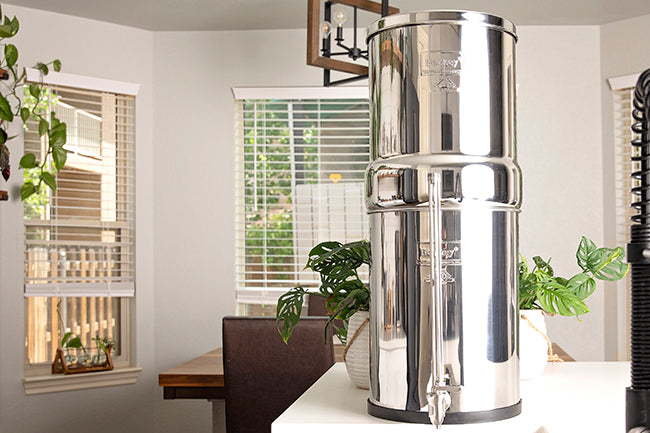
How to Clean the Berkey Water Filter System: Step-by-Step Maintenance and Cleaning Guide
By Dan DeBaunShare
If you have invested in a Berkey water filtration system, you no doubt expect to enjoy contaminant-free water that tastes great. However, it’s important to note that your Berkey system needs to be cleaned regularly to maintain its effectiveness and ensure the water remains free of contaminants and safe to drink.
This article provides a step-by-step guide on how to clean your Berkey system, regardless of which system you own. If you are interested in learning the process of cleaning your filters, we also have a guide on how to clean Black Berkey filter elements.
In this article, you'll learn:
- Step-by-step Guide to Cleaning Your Berkey System
- How Often Should the Berkey System be Cleaned
- How to Clean Rust on Your Berkey System
- Berkey Water Filter Systems Maintenance and Cleaning Tips
Step-by-step Guide to Cleaning Your Berkey System
What You'll Need:
- Dish soap (non-abrasive, non-scented)
- Soft sponge or cloth
- A clean, soft brush or toothbrush
- Clean water
- White vinegar (optional, for deep cleaning)
Step 1: Disassemble the System
Remove the lid and set it aside. Take out the upper chamber that holds the Black Berkey Filters and empty any remaining water from the upper and lower chambers. Remove the filters from the upper chamber by unscrewing the wingnuts and washers that hold them in place.
Step 2: Clean the Chambers
Wash the upper and lower chambers using a soft sponge or cloth and mild dish soap. Be sure to clean both the inside and outside of the chambers. Rinse thoroughly with clean water to remove any soap residue.
Step 3: Clean the Spigot
Remove the spigot from the lower chamber. Disassemble the spigot if possible, and clean each part with mild dish soap and a brush or toothbrush. Rinse thoroughly in clean water and reassemble.
Step 4: Optional Deep Cleaning
If the system has a noticeable buildup of algae, grime, or scale – or hasn’t been cleaned for some time – you can soak the chambers in a mixture of white vinegar and water (1:1 ratio) for about 10 minutes.
White vinegar contains at least 5% acetic acid, which kills algae and can dissolve dirt, debris, and grime. Also, vinegar has limited disinfectant properties and can kill pathogens such as E.coli, Salmonella, and Listeria.
Rinse the system thoroughly with clean water before reassembling all the components.
Step 5: Clean the Black Berkey Filters
The manufacturers recommend that the Black Berkey filter elements are cleaned every time you clean your Berkey system.
To clean the Black Berkey filters, gently scrub the Black Berkey filter elements under running water using a clean, soft brush or Scotch Brite pad to remove any buildup or residue. Do not use soap on the filters, as it can damage them. Rinse the filters thoroughly under running water.
We also have informative guides on how to clean and prime your Berkey filters that provide more detailed information on when and how to clean them.
Step 6: Reassemble the System
To put your Berkey back together again, reattach the Black Berkey filters to the upper chamber and reinstall the spigot in the lower chamber. Insert the upper chamber back into the top of the lower chamber.
Once the system is reassembled, fill the upper chamber with water and let it filter through to test whether everything's working properly.
How Often Should the Berkey System be Cleaned
Various tell-tale signs will indicate that your Berkey system needs to be cleaned.
Any visible buildup of algae, dirt, or scale/minerals (usually visible as white deposits) on the surface of the chambers or filters is a clear indication that it's time to clean your Berkey.
Also, if the flow rate starts to slow down and your system is not filtering water as fast as it should, your filters most likely need to be cleaned.
How to Clean Rust on Your Berkey System
The term "Stainless Steel" is a slightly misleading name. A more accurate description would be "Harder to Stain Steel." While the Berkey water filter systems uses a surgical grade 304 stainless steel, the largest single component of this material is steel, and it can potentially rust over time.
The chromium (when exposed to oxygen in the atmosphere) forms a thin, invisible layer called chromium oxide. This invisible layer covering the entire surface gives stainless steel its ability to resist stains and rust.
If this layer gets compromised, rust forms on the surface at the point of the damage. We rarely hear of rusting issues, but the good news is that with a little cleaning and care, the chromium oxide layer is self-healing, and your Berkey chambers can be refreshed back to their original brand-new condition.
Caring for Big Berkey Surgical Grade 304 Stainless Steel
Do you want the chromium oxide layer to protect your Berkey system for as long as possible? In that case, avoid using cleaners that contain chlorides (fluorine, chlorine, bromine, iodine, etc.). Cleaners containing alcohol, ammonia, or mineral spirits can also damage the protective layer.
Don’t use steel wool or steel brushes, as minute pieces of these carbon steel particles may adhere to the stainless surface and begin to rust. Avoid caustic cleaners containing any of the above.
If you intend to use these compounds, you should take extreme care to remove all traces of the cleaner because these chemicals damage the chromium oxide layer, and you don’t want them in contact with your drinking water.
Stainless steel and the chromium oxide layer actually thrive on proper cleaning. For everyday cleaning of non-oxidized soils, dust, dirt, and fingerprints, you should use a mild soap/detergent (dish detergent) and warm water solution.
Use the solution to remove the soil, rinse with fresh water and a clean cloth, and dry completely. Another alternative is to clean with a recommended stainless steel cleaner such as Cerama Bryte Stainless Steel Cleaner.
How to Remove Oxidized Stains and Surface Rust
Removal of oxidized stains and even "surface rust can be done by using a paste made from baking soda and water. Many of our customers opt for this basic organic approach.
Alternatively, a cleaner that contains oxalic acid, such as Bar Keeper's Friend Soft Cleanser, is also effective If you opt for baking soda and water, use a cloth or soft bristle brush to rub the baking soda in the direction of the grain. This may take a little effort, but the stains will disappear.
Once they are removed, rinse with clean water on a clean, soft cloth.
If using Bar Keeper's Friend, use only the liquid cleanser (free of grit), and be sure to rub in the direction of the metal grain lines with a damp, soft sponge.
Berkey Water Filter Systems Maintenance and Cleaning Tips
Regular cleaning will ensure your system continues to function optimally. Clean your Berkey system every 2-4 weeks or as needed, depending on your usage and buildup.
It's also a good idea to conduct regular maintenance checks. Check the spigot regularly for wear and tear, and swap it if necessary.
Replace the Black Berkey filters according to the manufacturer's recommendations, which is 3,000 gallons per filter element. As per this recommendation, a pair of 2 Black Berkey elements will filter 6,000 gallons before replacement is needed.
Follow the guidelines from this article to keep your Berkey water filtration system working at its best!
-
Regular price From $302.00 USDRegular priceUnit price / per
-
Regular price $234.00 USDRegular priceUnit price / per
-
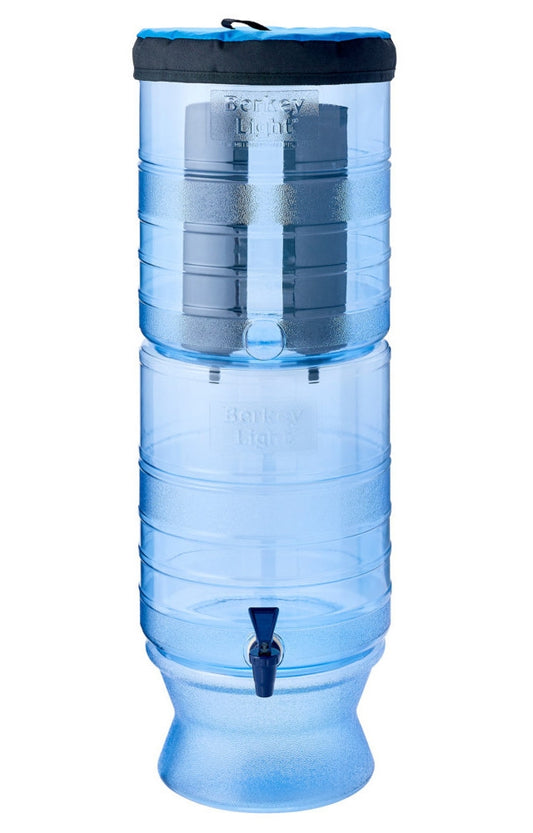
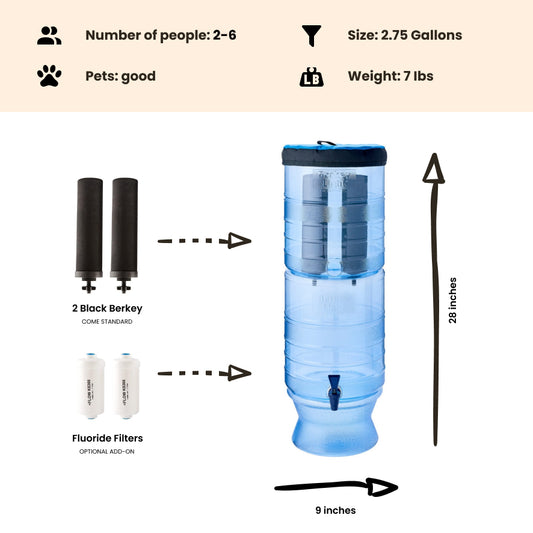 Sold outRegular price From $305.00 USDRegular priceUnit price / per
Sold outRegular price From $305.00 USDRegular priceUnit price / per -
Regular price $327.00 USDRegular priceUnit price / per
-

 Sold outRegular price From $367.00 USDRegular priceUnit price / per
Sold outRegular price From $367.00 USDRegular priceUnit price / per -
Regular price From $408.00 USDRegular priceUnit price / per
-
Regular price From $531.00 USDRegular priceUnit price / per

Dan DeBaun
Dan DeBaun is the owner and operator of Big Berkey Water Filters. Prior to Berkey, Dan was an asset manager for a major telecommunications company. He graduated from Rutgers with an undergraduate degree in industrial engineering, followed by an MBA in finance from Rutgers as well. Dan enjoys biohacking, exercising, meditation, beach life, and spending time with family and friends.
~ The Owner of Big Berkey Water Filters

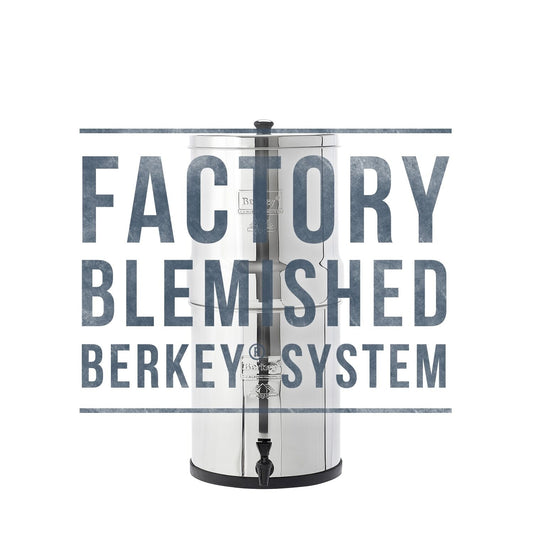
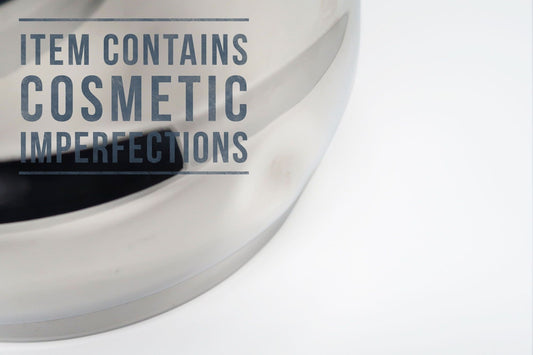








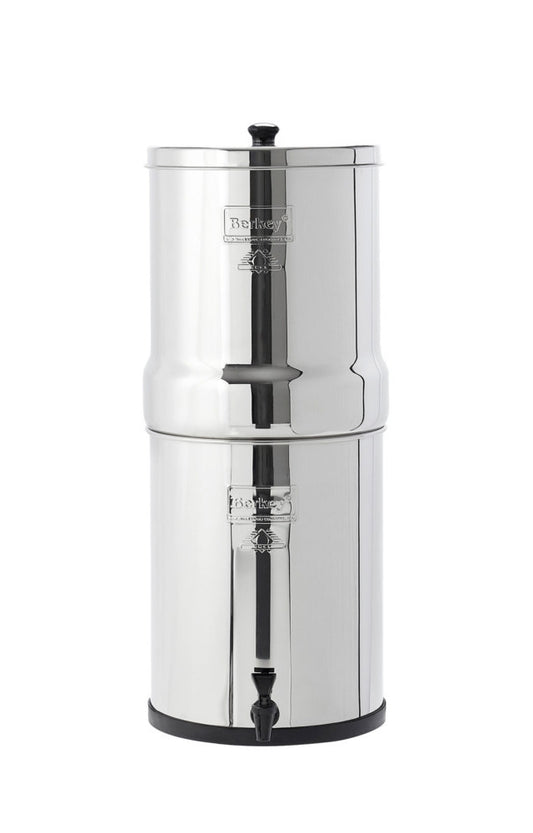
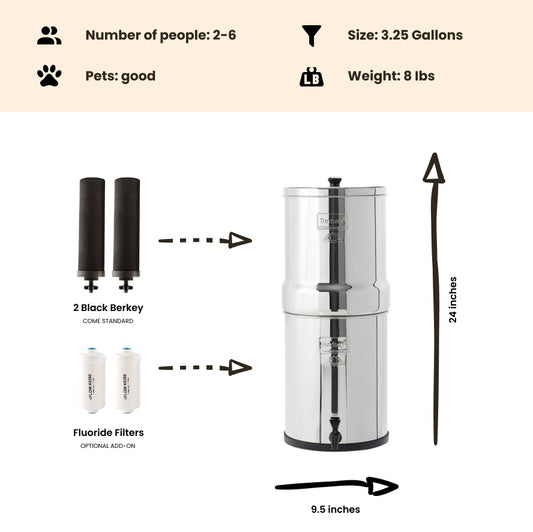



We have 2 adults in our household. We have the big Berkey water filtration system with two of the black filters and two fluoride filters. You mentioned that with two black filters you’ll get about 6000 gallons before you need to replace your filters. In general, how long does it take to go through 6000 gallons of water?
Hi Katherine -
We say approx 3-5 years, but could even be longer.
Thanks
Dan